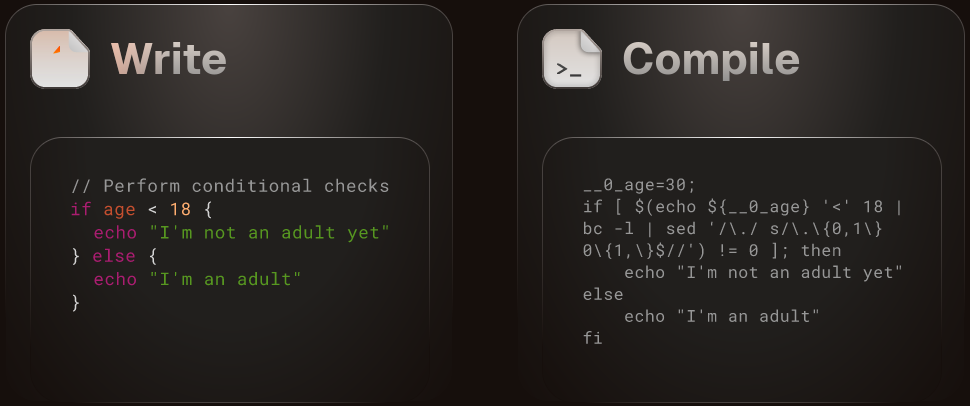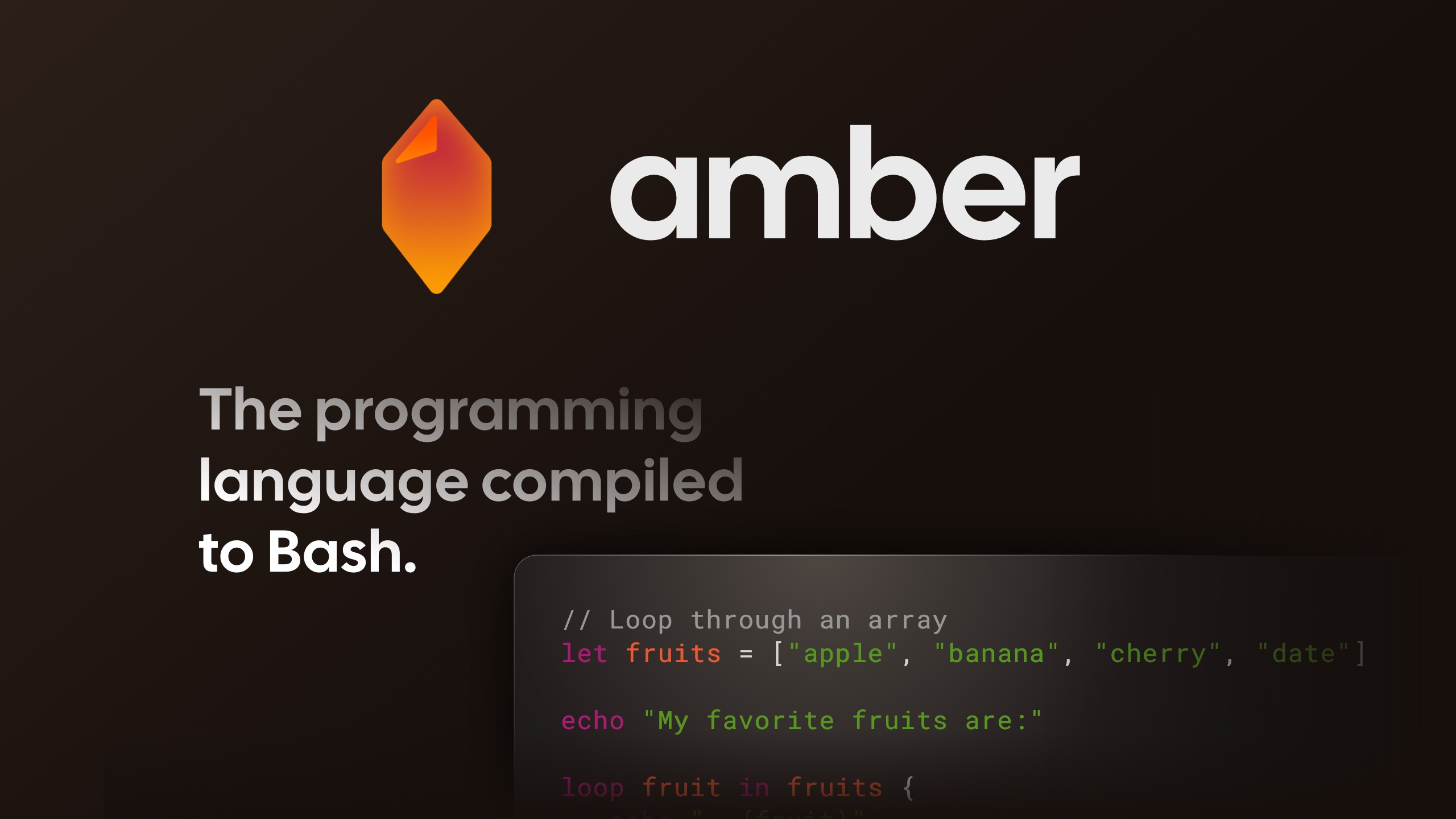New favorite tool 😍
One day, someone’s going to have to debug machine-generated Bash. <shivver>
You can do that today. Just ask Chat-GPT to write you a bash script for something non-obvious, and then debug what it gives you.
For maximum efficiency we’d better delegate that task to an intern or newly hired jr dev
Looking at the example

Why does the generated bash look like that? Is this more safe somehow than a more straighforward bash if or does it just generate needlessly complicated bash?
Yeah that shit is completely unreadable
I doubt the goal is to produce easily understood bash, otherwise you’d just write bash to begin with. It’s probably more similar to a typescript transpiler that takes in a language with different goals and outputs something the interpreter can execute quickly (no comment on how optimized this thing is).
So many forks for something that can be solved entirely with bash inbuilts
The language idea is good, but:
THREE.WebGLRenderer: A WebGL context could not be created. Reason: WebGL is currently disabled.Seriously? Why do I need WebGL to read TEXT in docs? :/
As someone who has done way too much shell scripting, the example on their website just looks bad if i’m being honest.
I wrote a simple test script that compares the example output from this script to how i would write the same if statement but with pure bash.
here’s the script:
#!/bin/bash age=3 [ "$(printf "%s < 18\n" "$age" | bc -l | sed '/\./ s/\.\{0,1\} 0\{1,\}$//')" != 0 ] && echo hi # (( "$age" < 18 )) && echo hiComment out the line you dont want to test then run
hyperfine ./scriptI found that using the amber version takes ~2ms per run while my version takes 800microseconds, meaning the amber version is about twice as slow.
The reason the amber version is so slow is because: a) it uses 4 subshells, (3 for the pipes, and 1 for the $() syntax) b) it uses external programs (bc, sed) as opposed to using builtins (such as the (( )), [[ ]], or [ ] builtins)
I decided to download amber and try out some programs myself.
I wrote this simple amber program
let x = [1, 2, 3, 4] echo x[0]it compiled to:
__AMBER_ARRAY_0=(1 2 3 4); __0_x=("${__AMBER_ARRAY_0[@]}"); echo "${__0_x[0]}"and i actually facepalmed because instead of directly accessing the first item, it first creates a new array then accesses the first item in that array, maybe there’s a reason for this, but i don’t know what that reason would be.
I decided to modify this script a little into:
__AMBER_ARRAY_0=($(seq 1 1000)); __0_x=("${__AMBER_ARRAY_0[@]}"); echo "${__0_x[0]}"so now we have 1000 items in our array, I bench marked this, and a version where it doesn’t create a new array. not creating a new array is 600ms faster (1.7ms for the amber version, 1.1ms for my version).
I wrote another simple amber program that sums the items in a list
let items = [1, 2, 3, 10] let x = 0 loop i in items { x += i } echo xwhich compiles to
__AMBER_ARRAY_0=(1 2 3 10); __0_items=("${__AMBER_ARRAY_0[@]}"); __1_x=0; for i in "${__0_items[@]}" do __1_x=$(echo ${__1_x} '+' ${i} | bc -l | sed '/\./ s/\.\{0,1\}0\{1,\}$//') done; echo ${__1_x}This compiled version takes about 5.7ms to run, so i wrote my version
arr=(1 2 3 10) x=0 for i in "${arr[@]}"; do x=$((x+${arr[i]})) done printf "%s\n" "$x"This version takes about 900 microseconds to run, making the amber version about 5.7x slower.
Amber does support 1 thing that bash doesn’t though (which is probably the cause for making all these slow versions of stuff), it supports float arithmetic, which is pretty cool. However if I’m being honest I rarely use float arithmetic in bash, and when i do i just call out to bc which is good enough. (and which is what amber does, but also for integers)
I dont get the point of this language, in my opinion there are only a couple of reasons that bash should be chosen for something a) if you’re just gonna hack some short script together quickly. or b) something that uses lots of external programs, such as a build or install script.
for the latter case, amber might be useful, but it will make your install/build script hard to read and slower.
Lastly, I don’t think amber will make anything easier until they have a standard library of functions.
The power of bash comes from the fact that it’s easy to pipe text from one text manipulation tool to another, the difficulty comes from learning how each of those individual tools works, and how to chain them together effectively. Until amber has a good standard library, with good data/text manipulation tools, amber doesn’t solve that.
This is the complete review write up I love to see, let’s not get into the buzzword bingo and just give me real world examples and comparisons. Thanks for doing the real work 🙂
Compiling to bash seems awesome, but on the other hand I don’t think anyone other than the person who wrote it in amber will run a bash file that looks like machine-generated gibberish on their machine.
I disagree. People run Bash scripts they haven’t read all the time.
Hell some installers are technically Bash scripts with a zip embedded in them.
Compiling to bash seems awesome
See, i disagree because
I don’t think anyone other than the person who wrote it in amber will run a bash file that looks like machine-generated gibberish on their machine.
Lol I barely want to run (or read) human generated bash, machine generated bash sounds like a new fresh hell that I don’t wanna touch with a ten foot pole.

There’s a joke here but I’m not clever enough to make it.
Pretty cool bug. Looks like a surreal meme
what browser are you using? It renders just fine on mobile and desktop to me
Whatever boost defaults to on a note9
I’m very suspicious of the uses cases for this. If the compiled bash code is unreadable then what’s the point of compiling to bash instead of machine code like normal? It might be nice if you’re using it as your daily shell but if someone sent me “compiled” bash code I wouldn’t touch it. My general philosophy is if your bash script gets too long, move it to python.
The only example I can think of is for generating massive
install.shI like the idea in principle. For it to be worth using though, it needs to output readable Bash.
Why?
Because you still need to be able to understand what’s actually getting executed. There’s no debugger so you’ll still be debugging Bash.
Just learn Bash lol
I’m trying but I’m shooting my own foot all the time 😢
It’s okay it’s filled with foot guns.
Why not compile it to sh though.
There is no sh shell. /bin/sh is just a symlink to bash or dash or zsh etc.
But yes, the question is valid why it compiles specifically to bash and not something posix-compliant
There is no sh shell.
lol
Yes, there was the bourne sh on Unix but I don’t see how that’s relevant here. We’re talking about operating systems in use. Please explain the downvotes
It’s relevant because there are still platforms that don’t have actual Bash (e.g. containers using Busybox).
shis not just a symlink: when invoked using the symlink, the target binary must run in POSIX compliant mode. So it’s effectively a sub-dialect.Amber compiles to a language, not to a binary. So “why doesn’t it compile to
sh” is a perfectly reasonable question, and refers to the POSIX shell dialect, not to the/bin/shsymlink itself.Thanks
let

What are you talking about?
The Javascript style syntax
letis also used to declare values in better languages than JavaScript, such as Haskell and ML family languages like OCaml and F#
About the
letkeyword, which is used to declare a variable.I thought so, but why do they object? Do they want Bash’s error-prone implicit variable declaration?
They, most probably, just didn’t like the name.
with no support for associative arrays (dicts / hashmaps) or custom data structs this looks very limited to me
Does Bash support those? I think the idea is that it’s basically Bash, as if written by a sane person. So it supports the same features as Bash but without the army of footguns.
A language being compiled should be able to support higher-level language concepts than what the target supports natively. That’s how compiling works in the first place.
That depends on how readable you want the output to be. It’s already pretty bad on that front. If you start supporting arbitrary features it’s going to end up as a bytecode interpreter. Which would be pretty cool too tbf! Has anyone written a WASM runtime in bash? 😄
Honestly, wouldn’t it be great if POSIX eventually specified a WASM runtime?
Yeah definitely! I wouldn’t hold your breath though. Especially as that’s pretty much an escape route from POSIX. I doubt they’d be too keen to lose power.
it does, well at least associative arrays
I’m a mathematician with very limited programming experience. Can someone explain the significance of this?
Bash is one of the most used shell language, it’s installed on almost all Linux and Mac systems and can also be used on windows. Almost no one likes writing it as it is convoluted and really really hard to read and write. There are many replacement language’s for it, but using them is troublesome, because of incompatibilities. Amber is compiled which will solve problems with compatibility and it seems that language itself is very readable. On top of that it has most futures that modern programmers need.
Thank you, I think I understand now. 🙂
Basically dealing with abandoned-by-god syntax and limitations of bash. You can abstract them away!
As a long-time bash, awk and sed scripter who knows he’ll probably get downvoted into oblivion for this my recommendation: learn PowerShell
It’s open-source and completely cross-platform - I use it on Macs, Linux and Windows machines - and you don’t know what you’re missing until you try a fully objected-oriented scripting language and shell. No more parsing text, built-in support for scalars, arrays, hash maps/associative arrays, and more complex types like version numbers, IP addresses, synchronized dictionaries and basically anything available in .Net. Read and write csv, json and xml natively and simply. Built-in support for regular expressions throughout, web service calls, remote script execution, and parallel and asynchronous jobs and lots and lots of libraries for all kinds of things.
Seriously, I know its popular and often-deserved to hate on Microsoft but PowerShell is a kick-ass, cross-platform, open-source, modern shell done right, even if it does have a dumb name imo. Once you start learning it you won’t want to go back to any other.
I appreciate you sharing your perspective. Mine runs counter to it.
The more PowerShell I learn, the more I dislike it.As someone who spent 2 years learning and writing PowerShell for work… It’s… Okay. Way easier to make stuff work then bash, and gets really powerful when you make libraries for it. But… I prefer Python and GoLang for building scripts and small apps.
Do you write it for work?
I do. Currently I use it mostly for personal stuff as part of my time spent on production support. Importing data from queries, exporting spreadsheets, reading complex json data and extracting needed info, etc. In the past when I was on DevOps used it with Jenkins and various automation processes, and I’ve used it as a developer to create test environments and test data.
Nice! Sounds like a good use case.
Here’s a language that does bash and Windows batch files: https://github.com/batsh-dev-team/Batsh
I haven’t used either tool, so I can’t recommend one over the other.
If their official website isn’t https://batsh.it I’m going to be very sad.
Edit: ☹️










